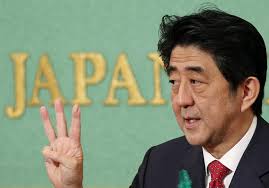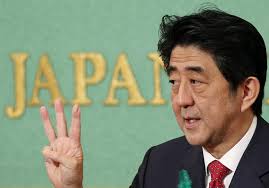
If Japanese Prime Minister Shinzo Abe’s approval rating continues to decline, a market researcher has warned that the markets could start to question the long-term sustainability of Abe's economic program which is better and momre commonly referred to as 'Abenomics'.
"In terms of all that good news we're hearing from Japan, the most interesting story out of Japan at the moment is the collapse of approval rating of Prime Minister Abe," Derek Halpenny, market researcher at the Mitsubishi UFJ Financial Group, said during a television interview. "And the most recent approval rating data we got today, we saw the biggest collapse in the cabinet approval rating since Prime Minister Abe came into power in 2012."
a new set of fresh doubt over the success of his administration's economic reforms were shed after Japan's third longest serving post-war prime minister was hit by poor approval ratings on Friday.
And for the first time during his tenure as the Prime Minister, sliding below 30 percent is the approval rating for Abe's government which sunk to 29.9 percent. And according to a poll for the Jiji news agency, his disapproval rating rising to 48.6 percent.
While 47 percent disapproved, only 33 percent of the Japanese public approved of the prime minister, revealed a poll for the Asahi newspaper earlier this week.
Since Mr Abe's re-election in 2012, these were the worst approval figures.
The markets beginning to doubt the prime minister's economic program was the very real possibility in the very near future, Halpenny said.
He added that a general election by the end of the year, Abe's Liberal Democratic Party holding a leadership election in September of 2018 and the Bank of Japan's governor Haruhiko Kuroda completing his term in April 2018, could further damage the lowering confidence among the markets about the Japanese prime Minister.
"When you have Abe's approval rating collapsing like this, there is a risk that the markets could start to question the long-term sustainability of Abenomics," he said.
"Three arrows" of monetary easing, fiscal stimulus and structural reforms – forms the real basis of the prime minister's 'Abenomics' program.
Scandals surrounding the prime minister, the most recent being a private school linked to Abe buying discounted public land, could be one of the primary factors that has led ot the decline of Abe's approval rating, some experts have commented on the issue.
For 2017, the its overall forecast for gross domestic product (GDP) growth has been left unchanged by Abe's government. The government expects the GDP to grow by 1.5 percent in the current fiscal year and by 1.4 percent in 2018/19.
(Source:www.cnbc.com)
"In terms of all that good news we're hearing from Japan, the most interesting story out of Japan at the moment is the collapse of approval rating of Prime Minister Abe," Derek Halpenny, market researcher at the Mitsubishi UFJ Financial Group, said during a television interview. "And the most recent approval rating data we got today, we saw the biggest collapse in the cabinet approval rating since Prime Minister Abe came into power in 2012."
a new set of fresh doubt over the success of his administration's economic reforms were shed after Japan's third longest serving post-war prime minister was hit by poor approval ratings on Friday.
And for the first time during his tenure as the Prime Minister, sliding below 30 percent is the approval rating for Abe's government which sunk to 29.9 percent. And according to a poll for the Jiji news agency, his disapproval rating rising to 48.6 percent.
While 47 percent disapproved, only 33 percent of the Japanese public approved of the prime minister, revealed a poll for the Asahi newspaper earlier this week.
Since Mr Abe's re-election in 2012, these were the worst approval figures.
The markets beginning to doubt the prime minister's economic program was the very real possibility in the very near future, Halpenny said.
He added that a general election by the end of the year, Abe's Liberal Democratic Party holding a leadership election in September of 2018 and the Bank of Japan's governor Haruhiko Kuroda completing his term in April 2018, could further damage the lowering confidence among the markets about the Japanese prime Minister.
"When you have Abe's approval rating collapsing like this, there is a risk that the markets could start to question the long-term sustainability of Abenomics," he said.
"Three arrows" of monetary easing, fiscal stimulus and structural reforms – forms the real basis of the prime minister's 'Abenomics' program.
Scandals surrounding the prime minister, the most recent being a private school linked to Abe buying discounted public land, could be one of the primary factors that has led ot the decline of Abe's approval rating, some experts have commented on the issue.
For 2017, the its overall forecast for gross domestic product (GDP) growth has been left unchanged by Abe's government. The government expects the GDP to grow by 1.5 percent in the current fiscal year and by 1.4 percent in 2018/19.
(Source:www.cnbc.com)





